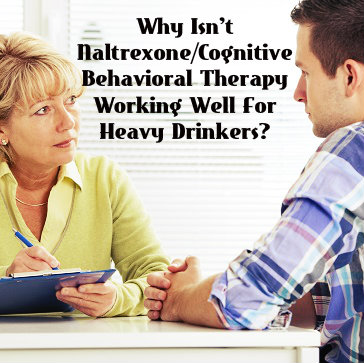Why Do Heavy Drinkers Have A Lower Adherence To Naltrexone/Cognitive Behavioral Therapy?
Treatment programs for people affected by alcoholism commonly feature medications, some form of counseling or psychotherapy, or a combination of medication and counseling or psychotherapy. Together, a medication called naltrexone and a form of therapy called cognitive behavioral therapy have been shown to produce beneficial results in controlled testing. In a study published in March 2014 in The American Journal of Drug and Alcohol Abuse, researchers from two Finnish institutions sought to determine if the naltrexone/cognitive behavioral therapy combination works as well in a less controlled setting that mimics a typical treatment environment.
What Is Naltrexone And How Does It Work?
 Naltrexone is a medication that blocks access to sites, called opioid receptors, located on nerves in both the brain and certain parts of the body. When used in a person addicted to opioid substances of abuse, this blocking action prevents the characteristic “high” associated with narcotics. For reasons that researchers and doctors don’t fully understand, the same blocking action helps reduce the amount of pleasure derived from alcohol consumption, in addition to decreasing the intensity of any urges to drink more alcohol.
Naltrexone is a medication that blocks access to sites, called opioid receptors, located on nerves in both the brain and certain parts of the body. When used in a person addicted to opioid substances of abuse, this blocking action prevents the characteristic “high” associated with narcotics. For reasons that researchers and doctors don’t fully understand, the same blocking action helps reduce the amount of pleasure derived from alcohol consumption, in addition to decreasing the intensity of any urges to drink more alcohol.
Together, these effects can help a person in recovery from alcoholism avoid relapsing back into a pattern of active drinking. As a rule, doctors give the medication only to recovering alcoholics who have entirely or largely halted their alcohol intake; doctors also typically use naltrexone as part of an overall treatment approach rather than as a sole component in treatment. The medication comes in forms that include tablets and an extended-release injection.
Cognitive Behavioral Therapy
Cognitive behavioral therapy is the umbrella term for a group of therapeutic approaches that focus on helping patients/clients identify and change thoughts and beliefs that can contribute to a range of harmful behaviors, including the abuse of alcohol and/or drugs.
Specific approaches that fall under this umbrella include rational behavior therapy, dialectic behavior therapy and rational emotive behavior therapy. Cognitive behavioral therapy takes place in a limited timespan that usually lasts for about four months. Unlike some forms of psychotherapy that maintain a strict hierarchy between the therapist and patient/client, it features a shared process that calls on the patient/client to take an active role in achieving his or her treatment objectives. The objectives for any given individual are specific to his or her particular situation and self-perceived needs and wants.
Does The Combination Of Naltrexone And Cognitive Behavioral Therapy Work For Alcoholism?
In the study published in The American Journal of Drug and Alcohol Abuse, researchers from Finland’s University of Helsinki and National Institute for Health and Welfare assessed the usefulness of the naltrexone/cognitive behavioral therapy combination as a treatment for alcoholism in a real-world environment. They chose this line of inquiry, in part, because of the relative lack of information on the combination in people actively receiving treatment outside of a controlled, experimental setting. During the study, the researchers gathered data from 315 outpatients receiving both naltrexone and cognitive behavioral therapy for a 20-week period. Measurements of treatment success included relative levels of alcohol intake and relative levels of alcohol craving among the participants.
After completing their analysis of the treatment outcomes, the researchers concluded that the naltrexone/cognitive behavioral therapy combination does not work equally well for all people recovering from alcoholism. Those individuals most likely to benefit from naltrexone and cognitive behavioral therapy were people who consumed relatively small amounts of alcohol before entering treatment. Conversely, the individuals least likely to benefit from the combination drank relatively heavily before entering recovery, had never been in a recovery program before and had a fixed pattern of alcohol consumption before entering treatment.
When Naltrexone And Cognitive Behavioral Therapy Works Best
The authors of the study published in The American Journal of Drug and Alcohol Abuse note that, strictly speaking, the combination of naltrexone and cognitive behavioral therapy did not fail to produce good results.
Instead, those individuals who fared poorly often did not take their prescribed doses of the medication, especially when they continued to engage in significant amounts of drinking while taking part in treatment. The authors believe that the fairly low rate of compliance with naltrexone use may pose a serious concern for the real-world treatment of alcoholism, especially among severely affected alcoholics.
Consequently, they also believe that alcohol programs may need to use a more comprehensive set of treatment options in order to help heavily affected alcoholics improve while in recovery. On a related note, doctors can use the extended-release, injectable form of naltrexone (Vivitrol) to overcome some of the problems with medication compliance.
Read Our Other Alcoholism Treatment Posts



